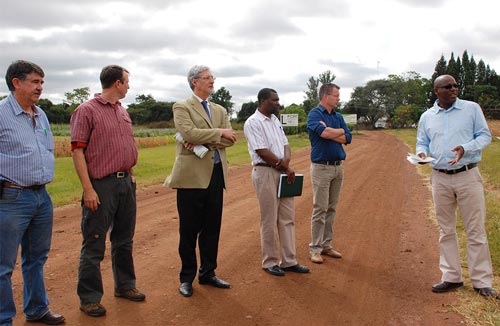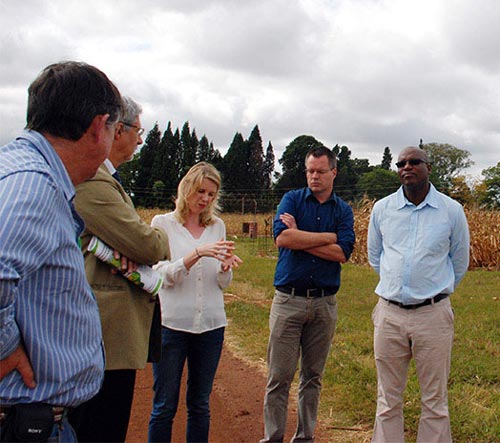
change with the Swiss Ambassador.
The Ambassador of Switzerland to Angola, Malawi, Zambia, and Zimbabwe, Luciano Lavizzari, accompanied by the Swiss Agency for Development and Cooperation (SDC) Food Security program officer for Zimbabwe Mkhululi Ngwenya, visited the CIMMYT Regional office for Southern Africa in Harare, Zimbabwe, on 23 April 2013. The CIMMYT-Harare staff provided a tour around the facilities and briefed them on CIMMYT’s work on food security geared towards finding solutions to challenges faced by farmers.
In the beginning of the visit, CIMMYT physiologist Jill Cairns discussed the issue of climate change. “As a result of climate change, the seasons are going to be much shorter,” explained Cairns, adding that in a region with the lowest maize yields globally, a lot more effort is required to deploy germplasm and farming systems adapted to respond to constraints in the region. Cairns discussed the work done by CIMMYT scientists in countering stresses such as low nitrogen, drought, and heat stress along the maize breeding pipeline from population development, pedigree breeding, to regional and on-farm trials in over 100 diverse locations. She also covered the phenotyping tools used in the research work and highlighted research gains in maize yields, many of which result from highly drought-tolerant maize lines and improved efficiencies of maize breeding pipeline in Eastern and Southern Africa.
John MacRobert, seed systems specialist, highlighted the importance of harmonizing seed systems in the region. “Some countries, like Zimbabwe, have very well developed seed sectors, while others are largely informal,” MacRobert said, stressing the negative consequences this may have on farmers. He then explained the importance of on-farm trials in incorporating farmer preferences such as grain texture in breeding work, using the example of SDC-funded New Seed Initiative for Maize in Southern Africa (NSIMA), a project whose acronym is fashioned after a popular maize staple dish in Zambia and Malawi known as nsima: “NSIMA targets a subset of smallholder farmers who consume the maize that they grow.” MacRobert also highlighted collaboration with other SDC projects whose seed systems encourage community-based seed companies targeting smallholder farmers.
Next on the agenda was conservation agriculture covered by agronomist Christian Thierfelder. “It is crucial to link improved varieties with the best management practices to ensure the sustainability of the cropping system,” stressed Thierfelder who then went on to demonstrate a range of sowing equipment from a stick to animal traction planters used in conservation agriculture.

Socioeconomist Girma T. Kassie turned attention to the consequences of lack of funding for smallholder farmers. For example, lack of funding programs to help the smallholder farmers acquire equipment limits uptake of improved planting practices. “Research on the impact of improved technologies aimed at improving livelihoods of smallholder farmers can help identify the gaps in technology transfer,” he added. Afterwards, the visitors toured CIMMYT trials where they observed the discussed technologies in the field.
CIMMYT has had a long-standing relationship with Switzerland through SDC, which currently funds several CIMMYT projects geared towards improving food security of smallholder farmers in East and Southern Africa. The projects, focusing on post-harvest losses reduction, conservation agriculture, and improved seed systems, include the Effective Grain Storage Project (EGSP), Seeds and Markets Project (SAMP), Harmonized Seed Security Project (HaSSP), and NSIMA. In addition, the SDC funds the ‘SDC-Junior Professional Officer’ supporting agronomist Stephanie Cheesman at the Global Conservation Agriculture Program team. CIMMYT highly appreciates the continued support from the Swiss government through SDC.
 Climate adaptation and mitigation
Climate adaptation and mitigation 
